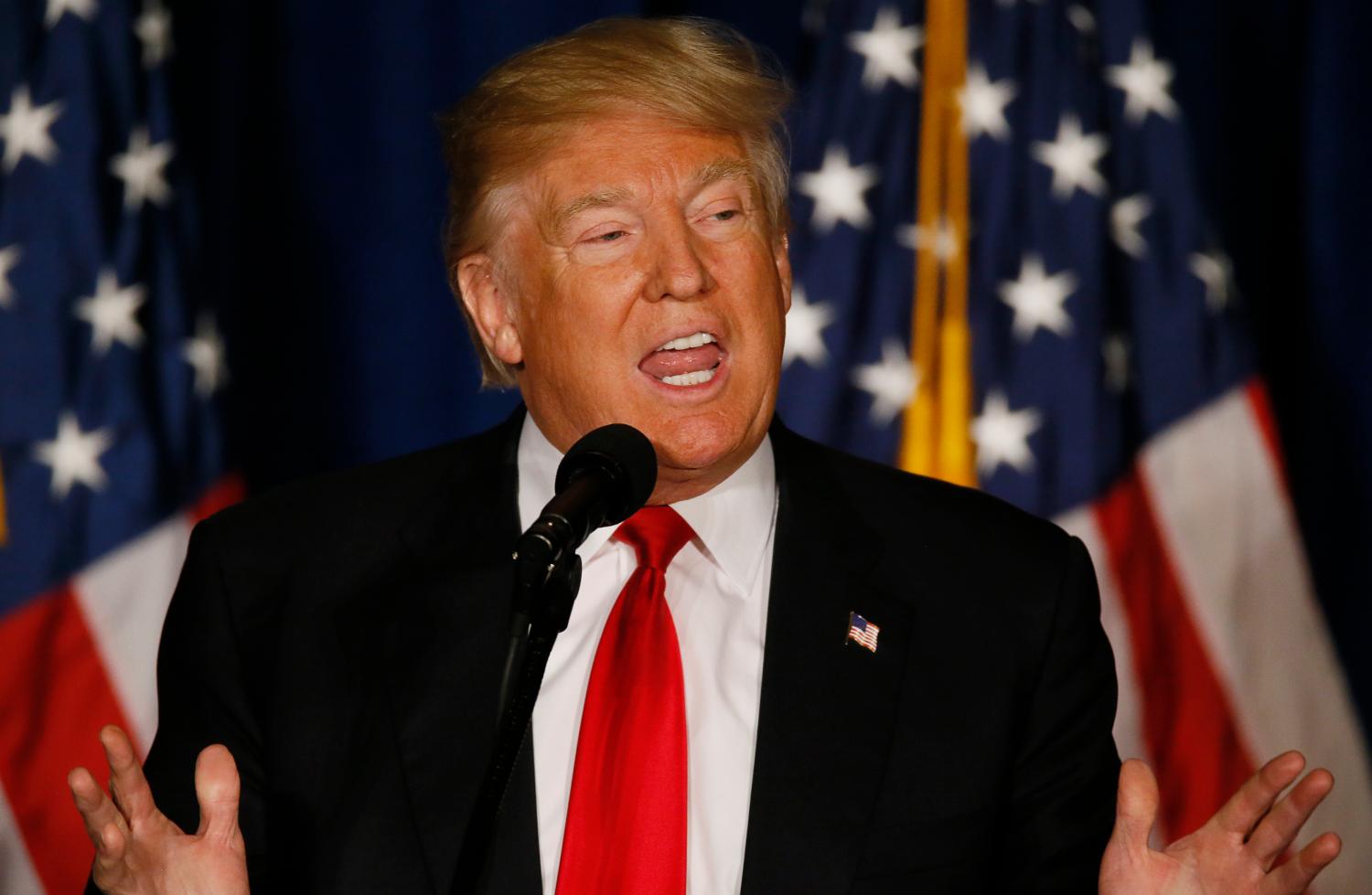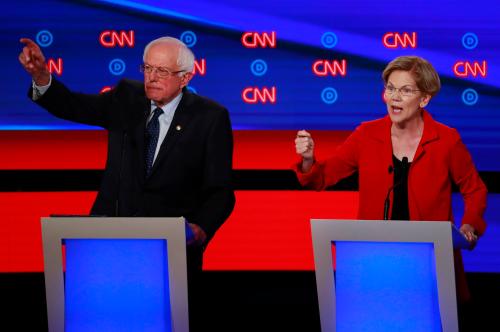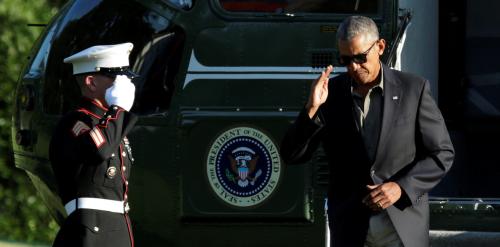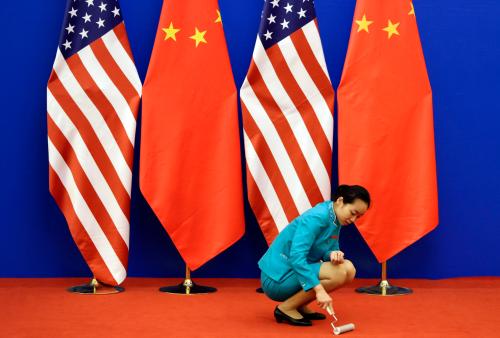Most believe that Hillary Clinton is a “hawk” on foreign policy, and that as president, she would escalate current U.S. military commitments in the Middle East and elsewhere. But President Hillary Clinton would not likely be the uber hawk that so many expect, argue Jeremy Shapiro and Richard Sokolsky. This post originally appeared on Vox.
Everybody knows Hillary Clinton, and everybody particularly knows her foreign policy views. After all, she has been a presence in national politics for more than 25 years and has a long record as first lady, senator, and secretary of state.
Most believe that Hillary Clinton is a “hawk” on foreign policy, and that as president, she would escalate current U.S. military commitments in the Middle East and elsewhere, dragging America into more military misadventures in various far-flung corners of the world.
For instance, the New York Times’ Mark Landler writes that “her affinity for the armed forces is rooted in a lifelong belief that the calculated use of military power is vital to defending national interests, that American intervention does more good than harm.”
Clinton has indeed often favored the use of force. But President Hillary Clinton would not likely be the uber hawk that so many expect. First, her record is in fact more nuanced than is often appreciated—she has just as often pushed for diplomatic solutions as military ones.
But more importantly, it is because, as president, she will find that the use of force abroad will offer precious few opportunities for making a difference, and will come at a considerable political cost at home.
The case for Hillary the Hawk
Portrayals of Hillary Clinton as super-hawkish on foreign policy typically point to a number of decisions she’s made over the years to support the use military force.
As first lady in the 1990s, she supported U.S. intervention in the former Yugoslavia. As a senator, she voted for the war in Iraq in 2003. She supported the troop surge in Afghanistan in 2009. As secretary of state, she advocated military intervention in Libya in 2011 and forceful measures in Syria (for example, the early arming of the moderate opposition and more recently the creation of safe or no-fly zones). Where others wavered, she supported the use of force to kill Osama bin Laden.
On the campaign trail, she has supported President Barack Obama’s decisions to deploy more special forces and intensify air strikes against the ISIS. Many of her advisers are prominent advocates of increased use of the military, particularly in Syria.
So it’s easy to look at her history and her belief in American leadership and exceptionalism and conclude that there will be no rest for war-weary Americans.
Clinton has been a hawk, but a prudent one
But while there is no doubt that Clinton has often supported the use of force, she just as frequently supported diplomacy and negotiations as the nation’s first line of defense.
As the Woodrow Wilson Center’s Aaron David Miller noted recently in the Wall Street Journal, Clinton frequently complained about the militarization of U.S. foreign policy when she was secretary of state and touted the virtues of “smart power” (the idea that all elements of national power are needed to solve foreign policy problems) and diplomacy in tackling the nation’s most serious national security challenges.
Consistent with this approach, she started the secret negotiations with Iran in 2012 that ultimately led to the Iran nuclear deal. She has similarly supported President Obama’s opening to Cuba. She supported and implemented the reset with Russia that began in 2009.
When China started becoming aggressive in the South China Sea, she did not reach for military tools, but rather looked to a regional diplomatic approach that stood in stark contrast to Beijing’s military aggression.
A President Clinton will have few opportunities for military intervention
And indeed, there will arguably be less need and less scope for her to show her military mettle as president than might have been the case a couple of years ago. It should be obvious, to paraphrase Woody Allen’s observation about life, that all the options for the use of force to repair a badly broken Middle East can be divided into the miserable and the horrible.
In Syria, the idea of risking U.S. boots on the ground or war with the Russians to support an opposition that consists largely of Islamist extremists is not likely to appeal to her any more than it has to President Obama.
For fighting ISIS, Clinton seems comfortable with Obama’s template for the use of military force: the limited use of armed drones, special operations forces, air strikes, and efforts to build local capacity for ground operations and stabilization duties.
Clinton has often emphasized that terrorism cannot be fully defeated on the battlefield. To deal with the evolving threat of transnational Islamic extremism, Clinton asserts, the real payoff lies in improved intelligence and law enforcement, greater international cooperation, limiting access to weapons, and efforts to stop radicalization and terrorist recruitment.
Clinton wants to be a domestic president
The most important reason that a President Hillary Clinton is unlikely to have a hawkish foreign policy is that she will no longer be a senator, or the secretary of state, or a presidential candidate. She will be president. And that means that her priorities will be very different.
There is an old adage in politics that where you stand depends on where you sit. And from where President Clinton would be sitting in the White House, the world—and more importantly, the domestic political context—will look different than it looked from her perch at the State Department.
As secretary of state, her views on matters of war and peace were shaped to some extent by the institutional viewpoint of the State Department. The secretary of state does not need to worry about domestic policy or the president’s public approval rating. As president, though, Clinton will be beholden to the American public and will have many other priorities beyond foreign policy that will occupy her attention.
As recent presidents have learned, military intervention abroad can carry a heavy political price at home. Despite the headlines of global disorder, there is no clamor from the American public or the Congress for a more active military policy, except from a handful of charter members of the Washington foreign policy establishment (or, as Obama’s aide Ben Rhodes described it, the “blob”).
This was broadly seen on the campaign trail in both the Democratic and Republican primaries, when hawkishness emerged as a political liability that both Bernie Sanders and Donald Trump profited from. A recent Pew survey, for example, found that 57 percent of Americans surveyed want the U.S. to deal with its own problems, while letting other countries get along as best they can. Only 27 percent of respondents felt that the United States is doing too little to solve world problems.
Asserting “lost” American leadership through the use of military force in Syria or elsewhere might make the foreign policy establishment and the editorial board of the Washington Post happy. But an overwhelming number of Republicans and Democrats in Congress as well as the general public would sour very quickly on prolonged, open-ended interventions that cost billions of dollars and risk American lives.
Clinton has the smarts to understand that she can only fight and win so many political battles as president. Clinton was an accidental secretary of state—she had not focused on foreign policy previously, she did not seek the position, and she did not get the job because of her experience in diplomacy.
And while she took to the job with enthusiasm and skill, she has always reserved her greatest passion and vision for domestic issues: health care, family issues, and promoting the rights of women and social justice generally. It is not a coincidence, for example, that of the seven “biggest accomplishments” listed on her campaign website, the first six are about health care, family issues, and human rights. (The last one refers to brokering a ceasefire between Israel and Hamas.)
She wants to make her mark in domestic policy and she will likely reserve her political capital to make the deals and compromises that will be necessary to advance her domestic policy agenda.
To do otherwise—to let her and her administration’s time and energy get taken up by unpopular military engagements—would not only break faith with the progressive wing of the party, but could also hurt her standing with the public.
Her husband’s administration spent much of its early political capital recovering from the October 1993 “Black Hawk Down” disaster, in which 18 U.S. Army Rangers were killed in Somalia. For Hillary Clinton, getting bogged down militarily in Syria at the outset of her administration, for example, could so reduce her political standing and so occupy her time that she would have little room left to implement her domestic agenda.
In the end, Clinton as president will likely continue to defy the labels of hawk or dove and continue to annoy advocates of both approaches. She may at times be more tempted than her predecessor to reach into the tool kit and pull out a military instrument to push back on enemies and adversaries.
But like her predecessor, she will not risk her political standing unless she is convinced that there is a strong case for how such an intervention will both improve the situation on the ground and meet with the approval of the American public. In the next four years, such cases will be few and far between.
Note: A previous version of this article claimed that Hillary Clinton supported the Iraq surge in 2007. She did not, and the sentence was corrected on August 19, 2016.
The Brookings Institution is committed to quality, independence, and impact.
We are supported by a diverse array of funders. In line with our values and policies, each Brookings publication represents the sole views of its author(s).









Commentary
Why Hillary Clinton wouldn’t be a foreign policy hawk as president
August 12, 2016